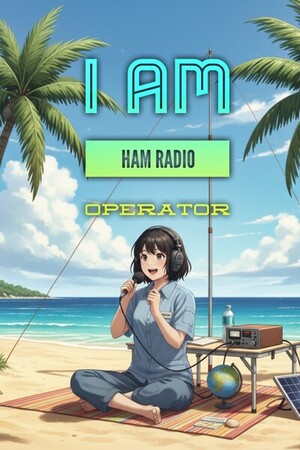Chapter 32:
Chapter 32: The Addiction of the Waterfall
I am Ham Radio Operator
My life quickly develops a new, all-consuming rhythm. It is the 15-second pulse of FT8. The mode is not just a part of my hobby; it becomes the soundtrack to my daily existence. My home office, where I work my demanding aerospace job, is now a dual-purpose command center. On one monitor, I have my complex satellite design simulations running. On the other, the WSJT-X waterfall is a constant, living presence.
The addiction is subtle at first, then all-encompassing. FT8 is a fundamentally different kind of operating. It does not demand my full, undivided attention like a fast-paced contest or a delicate Morse code conversation. It is a background process. It is a slow-drip IV of dopamine. While I am writing a technical report or analyzing test data for my job, the software is always running, decoding the world. A small, audible "ping" alerts me when a new country or a rare grid square appears on the screen.
It becomes a game I cannot stop playing. My brain, wired for engineering and problem-solving, is captivated by the optimization puzzle. I find myself constantly tweaking my station. I experiment with different audio levels, trying to find the perfect setting for a clean, efficient signal. I spend an entire weekend building a new, more resonant antenna for the 30-meter band, just to snag a few more rare stations in Asia. My work-life balance begins to blur, the line between my professional engineering and my hobby engineering becoming almost non-existent.
My apartment is rarely quiet anymore, and it is rarely dark. Even when I am not actively operating, the glow of the monitor paints the living room in a perpetual twilight. The soft hum of the radio's cooling fan is a constant companion. When I go to bed, I leave the radio on, the volume turned down. I cannot stand the thought of missing a rare propagation opening to Africa or the South Pacific while I am asleep. More than once, I wake up at 4 a.m. because my internal clock knows that this is the prime time for long-path propagation to Australia. I will stumble out of bed, my eyes bleary, and sit in front of the screen, clicking on callsigns in the pre-dawn glow.
My friends notice the change. Our weekly voice chats on the repeater become less frequent. When I do join, I am often distracted, my attention split between their voices and the waterfall on my screen.
"Haruka, are you even listening?" Doretha asks one night, a hint of frustration in her voice. "I just asked you about your new project at work."
"Sorry," I say, my eyes flicking to the screen as I confirm a contact with a station in Estonia. "Just, uh, multitasking. What did you say?"
Even Gregory, my steadfast Elmer, expresses his concern. "I have not heard you on CW in over a month, Haruka," he says during one of our phone calls. "Are you feeling alright?"
"I am great, Gregory!" I say, perhaps a little too enthusiastically. "I am just so busy with this new mode. I have already confirmed over a hundred new countries for my DXCC award in just a few months. It is amazing!"
"That is an achievement, to be sure," he says, his voice laced with a gentle skepticism I know all too well. "But are you having any fun? It sounds more like you are just collecting stamps."
His words sting because they hold a kernel of truth. The rich, personal interactions of the other modes are gone. I am no longer learning about a fellow operator's life in another country. I am not having thoughtful, rhythmic conversations in Morse code. I am simply exchanging data. I am collecting callsigns, grid squares, and award credits. It is a lonely pursuit, a solitary game played against the indifferent laws of physics.
But the allure of it is just too strong. Every ping of a new entity is a tiny victory, a little hit of satisfaction that keeps me coming back for more. The sheer volume of it is staggering. In the past, a good weekend of DXing might yield fifty new contacts. Now, I can log that many in a single evening, without even breaking a sweat.
I start to rationalize my obsession. This is not just stamp collecting, I tell myself. This is a scientific study of radio propagation. I am gathering data. I am observing the ionosphere in real-time, watching as the bands open and close, as signals from around the world fade in and out. I create spreadsheets and charts, tracking my contact rates by band and by time of day. I am turning my hobby into a massive data analysis project. It is the perfect justification for an engineer's mind.
But deep down, I know I am losing something. I am losing the balance. I am sacrificing the quality of connection for the quantity of contacts. The human element, the very thing that drew me to the hobby in the first place, is fading into the background hiss. My world is no longer a globe of potential friends, but a grid map waiting to be filled in, square by square. The waterfall is beautiful, mesmerizing, and endlessly fascinating. But it is also a current, and it is slowly, inexorably, pulling me away from the shore.




Please sign in to leave a comment.